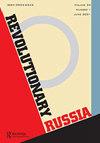Esperanto and Languages of Internationalism in Revolutionary Russia
IF 0.2
2区 历史学
Q2 HISTORY
引用次数: 0
Abstract
Trotsky and the Left Opposition, and the launching of the Stalinist dictatorship. Those local historians seeking to provide an objective and accurate telling of the events of 1917 were quickly displaced by political hacks more interested in advancing their own careers. Those who persisted in their efforts to produce something akin to scholarly historical accounts of 1917 were ignored or vanquished. Ultimately, the original purpose of Istpart was superseded by more pressing concerns and the entire enterprise was abandoned. Holmes’s story of the Istpart abandonment serves as an illustrative microcosm of the fate of Soviet historians more generally. Serving the political and ideological mandates of the regime was soon de rigueur; the craft of objective historians be damned. Holmes’s adroit mining of the archival evidence provides compelling support for his conclusion that:革命俄国的世界语与国际主义语言
托洛茨基和左翼反对派,以及斯大林专政的开始。那些试图客观准确地讲述1917年事件的当地历史学家,很快就被那些对自己的事业发展更感兴趣的政治黑客取代了。那些坚持努力写出类似于1917年学术历史记载的东西的人要么被忽视,要么被击败。最终,Istpart最初的目的被更紧迫的问题所取代,整个企业被放弃了。福尔摩斯关于伊斯特帕尔特被遗弃的故事是苏联历史学家命运的一个典型缩影。为政权的政治和意识形态任务服务很快成为了一种礼节;客观历史学家的手艺见鬼去吧。福尔摩斯对档案证据的巧妙挖掘为他的结论提供了强有力的支持:
本文章由计算机程序翻译,如有差异,请以英文原文为准。
求助全文
约1分钟内获得全文
求助全文

 求助内容:
求助内容: 应助结果提醒方式:
应助结果提醒方式:


